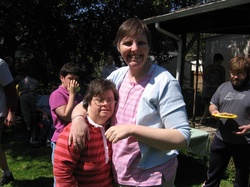Melissa Florer-Bixler stays at home with her highly energetic toddler. She is a graduate of Gordon College and Duke University, and will attend Princeton Theological Seminary in the fall. The picture at left shows Joni and Robin, two core members of the L’Arche community where Melissa served. She blogs at signonthewindow.wordpress.com.
Shortly after finishing my graduate studies at Duke
University I moved into the L’Arche community of Portland, Oregon. L’Arche
Nehalem is part of a federation of communities committed to making a home for
those with intellectual disabilities. I went to L’Arche on a hunch, thinking
that somewhere in the midst of caring for the personal needs of women and men
with intellectual disabilities I might find out a little bit more about Jesus.
I learned a lot over the three and a half years that I was
partnered with the men and women of L’Arche. For one, I came to understand why
Jesus made such a big deal about bodies. Growing up in a tradition that
considers internal, spiritual transformation paramount, I had to learn anew why
Jesus spent so much of his short earthly ministry healing and feeding. I came
to love the stories where Jesus defied social barriers by touching the
untouchables.
Yet when I first came to L’Arche, bodies were the part of
our life that made me most nervous. On that long drive from Virginia I wondered
how Jesus managed to love twisted limbs, pus-filled boils, and the scars of
self-mutilation. While I knew I could pray, walk to church and work with these
people, I obsessed over my ability to clean genitalia or assist a woman through
her menstrual cycle.
My teacher, in a very rigorous, daily lesson in theology of
the body, was a core member named Joni. Joni is the “lowest functioning” member
of L’Arche Nehalem. She was born what we consider genetically normal, but
contracted encephalitis as a young child. Unable to pay for hospital care,
Joni’s condition worsened and resulted in irreversible and life-altering brain
damage.
Joni was my gentle giant. Her body was proportioned to her
laugh, an unrestrained howl that echoed through our small house. She loved to
color–long hard strokes of crayons layering book after book. Over time I grew
to enjoy the quiet of Joni’s nonverbal world. Spending time with her looking at
pictures or listening to music in her room became my retreat in our noisy, busy
home.
But there were also times when I was afraid of Joni. I
remember how her huge body responded like a toddler’s: awkward, bumbling, out
of control. There was something
frightening about the power of her unrestrained bulk. It took months of
learning Joni’s nonverbal cues and homemade sign language to begin to
understand the way she made sense of her life.
After a very long time I came to understand the complex gift
of Joni’s vulnerability. Joni was a constant reminder that there is no neutral
corporeal form called “the body.” Bodies, particularly vulnerable bodies, are
sites for the exchange of power. Advocates for the intellectually disabled know
full well that providing the daily care for the disabled has the potential for
horrific abuse, almost always at the hands of caregivers.
Equally, though, bodies like Joni’s show us that Jesus has
uprooted this power. In his death and resurrection is the possibility of
turning fragility back on itself. In L’Arche this means that we live in the
expectation that those who assist our core members will begin to see their
brokenness in the broken bodies of their friends.
But Joni also reminds me that this is not a guarantee. We
see the possibility for transformation but we also encounter the potential for
neglect and pain. While those like myself, the temporarily able-bodied, posses
the will to forcefully avoid fragility, even to the point of ending our lives
if we so desire, Joni and her friends must cope with those who reject the
vulnerable body. In this way Joni and those like her are very much like the
Lamb of God who commanded us to wash each other’s feet and then went willingly
to his death.
It could be that this is what makes L’Arche such a special
ministry and why so many people feel that the task of caring for the
intellectually disabled is something far beyond their capacity for patience and
charity. It is not simply that we naturally desire to avoid the grotesque.
Rather, in Joni we anticipate our own incapacity and our own coming fragility,
and we fear being placed in the hands of those like us.
I often wonder how the debate around assisted suicide would
change if those anticipating a painful and debilitating illness were to walk
beside Joni for a year. Joni taught me the possibility of grace even when, and
perhaps most when, we lose control over that most intimate of places–our
bodies. She teaches us how to be gentle with those caretakers who are not
always patient, thorough or thoughtful of our needs. Joni’s gift, the gift of
L’Arche and places like it, is that we are allowed to walk beside ourselves and
to experience grace over and over again.
**For an explanation of the title “Perfectly Human,” and to read the first entry in this series, click here.
To read all the entries in the series, type “Perfectly Human” into the search box in the upper right.


